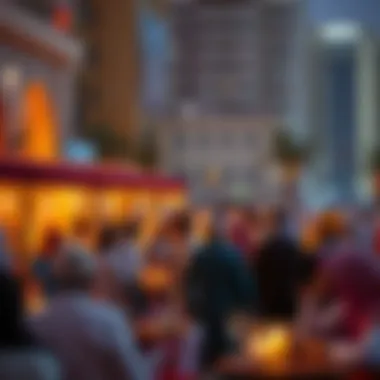Understanding Suhoor Time in Dubai: A Comprehensive Guide


Intro
As the sun begins to set and Ramadan approaches in Dubai, the significance of Suhoor becomes clear for many. Suhoor, the pre-dawn meal observed by Muslims, holds particular importance during this holy month. It’s not merely about eating before the fast; it's a deeply ingrained cultural practice that shapes daily life for many within this vibrant city.
Understanding Suhoor in Dubai is about more than just the timing of meals. It’s an exploration of how this tradition weaves itself into the fabric of community life, transforming ordinary routines into sacred rituals.
To appreciate the role Suhoor plays, one must consider the implications on various aspects of life in Dubai, including dining options, social interactions, and its influence on market trends, specifically in real estate. As we delve into the nuances of Suhoor hours, we’ll uncover how these practices not only touch the daily lives of individuals but also contribute to the overall spirit of a city that harmonizes its rich traditions with modern living.
Foreword to Suhoor
Suhoor represents a critical part of the daily rhythm during Ramadan in Dubai. This pre-dawn meal not only sustains individuals through a day of fasting but also embodies the traditions and cultural practices cherished by the Muslim community. Taking place just before the Fajr prayer, Suhoor is more than just a meal; it acts as a communal event where families and friends gather, signifying unity and shared values.
Understanding Suhoor is essential for anyone immersing themselves in Dubai's culture, whether they are long-time residents, newcomers, or even visitors during Ramadan. This meal intertwines nourishment and contemplation, serving as a reminder of faith, perseverance, and charity. The significance of Suhoor transcends mere consumption; it is a moment for reflection, gratitude, and togetherness.
This section sets the foundation for a deeper exploration of what Suhoor signifies and how it operates contextually within the frame of Ramadan in Dubai. This exploration can also help expats and investors understand the social dynamics at play, while residents can appreciate the value of their traditions more fully. By diving into the definition of Suhoor and its significance during Ramadan, we can uncover layers of meaning crucial for anyone engaging with the local culture.
Definition of Suhoor
Suhoor is the meal that takes place in the early hours before the fast begins at dawn. The exact timing is crucial as it marks the final opportunity for nourishment until sunset. This meal can range from a light snack to a full spread, often chosen based on personal preferences or family traditions. It provides not only energy but also hydration, setting individuals up to meet the demands of a fasting day ahead.
The word itself comes from the Arabic term associated with the act of eating before dawn. Many might think along the lines of breakfast, but Suhoor carries a deeper resonance for Muslims during Ramadan, reflective of both ritual and routine.
Significance of Suhoor in Ramadan
During Ramadan, Suhoor takes on a weighty significance beyond just physical sustenance. It’s an essential component of observing the fast, traditionally symbolizing the strength and commitment of believers. This communal engagement fosters a spirit of togetherness that strengthens family bonds and community ties.
The importance of Suhoor goes beyond individual nourishment. It set the stage for mindful reflection as the fast begins, as well as preparing individuals to face the day ahead with resilience. Some choose to sit in silence, reflecting on personal goals or spiritual objectives. Others engage in collective prayers or discussions with family about faith and community.
"Suhoor is where sustenance meets spirituality, a feast not only for the body but also for the soul."
Furthermore, Suhoor typically adapts through its execution, reflecting local culinary influences and innovations. Traditional meals may include dates, yogurt, and bread when combined with modern twists such as smoothies or elaborate dishes that showcase Dubai's rich culinary landscape. In this way, Suhoor also reflects Dubai's juxtaposition of the old and new, embodying a blend of heritage and contemporary life.
Overall, the significance of Suhoor during Ramadan is layered and multifaceted, representing wellness, reflection, and community. It draws various individuals together, whether they are native Emiratis, expats, or those traveling through. For all engaging in Dubai’s culture, understanding Suhoor and its place in this holy month reveals a tapestry woven with warmth, tradition, and unity.
Suhoor Timing in Dubai
Suhoor timing is a pivotal element that intertwines with the daily rhythms of life in Dubai, particularly during the sacred month of Ramadan. This pre-dawn meal is not merely a ritual but plays a crucial role in shaping the experiences and lifestyles of both locals and expatriates in this vibrant emirate. Understanding its timing and nuances provides insights into daily activities, community interactions, and even influences on real estate trends, making it a topic worthy of deep exploration.
Calculation of Suhoor Time
To grasp the significance of Suhoor timing, one must first understand how it is determined. Suhoor occurs before the Fajr prayer, marking the beginning of the daily fast during Ramadan. The exact time of Suhoor can vary, influenced by geographical location, seasonal changes, and the shifting sunrise. In Dubai, the determination of Suhoor time is typically based on standardized charts adopted by local religious authorities or through smartphone applications that provide precise timings.


Given that the Islamic calendar is lunar-based, the length of days can vary throughout the month of Ramadan. Initially, Suhoor occurs quite late, allowing individuals to indulge in a hearty meal. However, as the month progresses toward Eid al-Fitr, the days grow longer, resulting in earlier Suhoor hours. Therefore, it’s wise to keep an eye on local announcements from mosques or reputable Islamic calendars to ensure that you don’t miss this crucial meal.
Current Suhoor Time in Dubai
Keeping track of the current Suhoor time in Dubai can be as straightforward as checking local listings or websites dedicated to Islamic practices. As of the latest updates, the Suhoor time on most days is generally around 4:00 AM to 4:30 AM, depending on the day of Ramadan. Given this timeframe, many residents choose to wake up around 3:30 AM to prepare their meals and enjoy a quiet moment of reflection before the day’s fasting begins.
In this bustling city, many eateries offer special Suhoor menus during Ramadan, catering to those who prefer dining out. Establishments like Al Iwan and Royal China turn into bustling hubs in the early hours as diners savor traditional dishes before another day of fasting.
Thus, keeping a keen eye on Suhoor times not only supports one’s spiritual obligations but also enhances social engagement, allowing families and friends to gather for this essential meal amidst Dubai’s dynamic atmosphere.
"In a land where tradition meets modernity, the timing of Suhoor encapsulates a community united in faith while embracing contemporary lifestyles."
Through exploring Suhoor timing, one can appreciate how it influences life here in Dubai, meshing practices that honor the past with a fast-paced present.
Cultural Practices Related to Suhoor
The observance of Suhoor in Dubai is far more than just a meal before fasting begins. It encapsulates a unique tapestry of cultural practices that have evolved over the years. This period is not merely a routine but a cherished tradition deeply ingrained in the fabric of the community. It fosters connection—between friends, families, and even strangers—creating moments that are celebrated and remembered.
Traditional Foods Served
When we talk about traditional foods served at Suhoor, the tray is often brimming with a delightful mix of flavors and textures. Typical dishes range from hearty foul medames, a spiced fava bean dish rich in protein, to shakshuka, where eggs are poached in a vibrant tomato sauce.
Here are some classics you might encounter:
- Hummus: Creamy and rich, often accompanied by warm pita bread.
- Khubz: Traditional bread that pairs perfectly with various dips.
- Cheese: A spread of local cheeses adds diversity to the meal, often paired with olives and a drizzle of olive oil.
The beauty of Suhoor lies in its variety. Families often infuse their cultural backgrounds into the meal, adding distinct flavors that reflect their heritage. Moreover, sweets like date-filled pastries are favorites, carrying both nutritional benefits and cultural meaning, given their historical significance in Emirati cuisine.
“For many, Suhoor is the quiet moment before the day begins, bringing families together over shared stories and laughter.”
In the bustling city of Dubai, you'll find a blend of modern and traditional dishes. Beyond the basics, the culinary landscape continues to evolve, influenced by the city’s vast expatriate community, leading to countless fusion dishes that enhance the Suhoor experience.
Modern Trends in Suhoor
In recent years, there’s been a noticeable shift in how Suhoor is observed, reflecting broader changes in lifestyle and culinary preferences. Restaurants and cafés have begun to cater specifically to those seeking a unique Suhoor experience, offering creative twists on traditional dishes.
One way this manifests is through:
- Health-Conscious Options: More eateries are providing healthier versions of classic Suhoor items, using whole grains or organic ingredients. Items like avocado toast or smoothies have found a place on menus during Ramadan.
- Social Dining: Modern dining options have embraced the idea of sharing plates, encouraging communal experiences. Restaurants set up special Suhoor menus with dishes designed for sharing, creating a vibrant atmosphere.
- Takeaway and Delivery: The rise of food delivery services has also played a role in how Suhoor is experienced. Many families opt for convenience, having traditional meals delivered straight to their doors.
Suhoor has become a delightful blend of old and new, creating spaces where traditions can coexist with contemporary tastes. As investors or individuals looking into the lifestyle of Dubai, recognizing these trends offers valuable insight into the dynamics of community interactions and preferences during Ramadan. By understanding the cultural practices surrounding Suhoor, one can better appreciate the intricate relationship between residents and their diverse culinary heritage.


For those interested in more about Ramadan practices and cultural foods, resources like Wikipedia or Britannica can offer in-depth information.
Impact of Suhoor on Lifestyle Choices
In Dubai, the practice of Suhoor serves more than just a meal before the day's fasting begins; it encapsulates a unique lifestyle choice shaped by cultural significance. This late-night tradition not only influences individuals' eating patterns but also impacts broader lifestyle choices, from social interactions to real estate decisions. Understanding these nuances can give investors and realtors insight into how Ramadan creates shifts in community behavior and needs.
Home Preparations for Suhoor
When it comes to preparing for Suhoor at home, families often turn their kitchens into bustling hubs. It’s common to see plates filled with a variety of dishes ranging from traditional favorites to modern takes on breakfast classics. Each household has its own rituals, usually echoing what either their grandparents have taught them or the latest Instagram trends. For many, the night begins with planning, often involving the entire family gathering for some late-night cooking. Fresh fruits, yogurt, and local dishes such as foul medames (broad beans) or shakshuka (eggs in tomato sauce) become staples.
- Why Preparation Matters: Preparing Suhoor can create a sense of community and family bonding. Meals are shared, and conversations flow, allowing individuals to reflect on their goals for Ramadan.
- Effortless Convenience: In Dubai, some families opt for take-out or cater from local restaurants renowned for their Suhoor offerings. This can alleviate some of the cooking burdens but also shifts dining habits towards supporting local eateries, enhancing the economy.
In a bustling metropolis like Dubai, convenience is key. Whether it’s cooking or ordering take-out, the choice reflects a practical approach to Suhoor that suits busy lifestyles, all while emphasizing the importance of nutritional value to withstand the day-long fast ahead.
Dining Out Options during Ramadan
The dining scene in Dubai during Ramadan undergoes a transformation. As restaurants adapt to the rhythm of fasting, many offer special Suhoor menus designed to attract both families and the city's diverse expatriate community. Dining out not only satisfies hunger but also becomes an avenue for social gatherings and networking.
- Offers to Attract Diners: Eateries often feature buffets with a variety of Suhoor dishes. From hummus and succulent kebabs to sweet pastries like kunafa, these offerings are crafted to cater to both locals and expats.
- Business Considerations: Real estate and hospitality sectors see a spike in transactions and activities during Ramadan, as properties close to popular dining venues tend to fetch higher rents. Investors keep an eye on trends in hospitality, recognizing opportunities in the dynamic market conditions created by Ramadan’s unique atmosphere.
- Community Gatherings: Dining out during Suhoor has become more than a mere necessity. The shared experience fosters a sense of community among residents and visitors. Restaurants become social melting pots where people gather to break bread, share stories, and establish new connections—an essential aspect of Dubai’s vibrant lifestyle.
Dining out during Suhoor melds cultural practices with modern lifestyles, creating unique opportunities for community engagement.
In short, the impact of Suhoor stretches far beyond meal times. It influences home life, social interactions, and even market trends within Dubai. Investors and realtors alike can find strategic insights by observing how these practices shape lifestyles during Ramadan.
Community Events and Suhoor
The beauty of Suhoor is not just in the act of eating before dawn; it's rooted in community connection. During Ramadan, when the days are long and the nights seem short, these communal gatherings play a vital role in uniting individuals and families alike. Community events around Suhoor are vibrant, festive occasions that foster bonding and collective spirit. These gatherings, rich with shared laughter and experiences, help to solidify social ties.
Public Iftar and Suhoor Gatherings
Suhoor gatherings bring a unique flavor to the communal dining experience. Often held in parks, mosques, and cultural centers, these events allow people from various backgrounds to come together to enjoy a meal as dawn approaches. Local organizers frequently arrange such events to cater to a diverse crowd, showcasing a range of traditional dishes alongside more modern fare.
Key Elements of Public Suhoor Gatherings:
- Diversity: Participants often come from various ethnic backgrounds, adding new layers of flavors with each dish. This rich diversity emphasizes unity in cultural differences.
- Community Support: Many organizations and local businesses contribute food and resources to ensure that everyone can participate, regardless of their circumstances.
- Spiritual Connection: These gatherings are not just meals; they become places for spiritual reflection, prayer, and collective gratitude.
"The light of the community shines brightest when gathered in unity over a shared meal."
Events like these not only cultivate a sense of camaraderie but also demonstrate the city's commitment to inclusivity and shared traditions. It’s not just about the food; it’s the atmosphere that lingers long after the last bites are taken.
The Role of Hospitality Venues


In Dubai, hospitality venues play a pivotal part in enhancing the Suhoor experience. Many hotels and restaurants create specialized Suhoor menus that cater to the festive spirit of Ramadan. These establishments go above and beyond, offering unique settings that can make a simple meal feel like a grand event.
Influential Factors of Hospitality Venues During Suhoor:
- Atmosphere: With carefully designed interiors and the right kind of ambiance, these places provide a perfect backdrop for families and friends to gather.
- Culinary Diversity: Restaurants celebrate the essence of Suhoor by blending traditional dishes with contemporary culinary trends, ensuring there’s something for everyone's palate.
- Extended Hours: Many hospitality venues offer extended hours during Ramadan, allowing guests to indulge in Suhoor without feeling rushed as dawn looms.
The hospitality sector in Dubai recognizes that Ramadan is not just a month of fasting but also of togetherness. As such, these venues strive to create experiences that resonate with the cultural and emotional aspects of Suhoor, making the meal something everyone looks forward to.
Suhoor in the Context of Real Estate
Understanding Suhoor within the framework of real estate in Dubai reveals an intricate connection between cultural practices and market dynamics. As Ramadan unfolds, the impact of Suhoor extends far beyond individual routines, coming to play a significant role in shaping trends in the property market. The observance of Suhoor affects where people choose to live, how properties are marketed, and can even influence investment decisions.
Market Trends Influenced by Ramadan
During Ramadan, there's a noticeable shift in the market behavior that realtors recognize and capitalize on. Properties that are closer to cultural centers or areas hosting communal gatherings tend to see a spike in demand. Investors and developers often tailor their offerings to cater to those observing the fast.
- Increased Demand for Family-Oriented Homes: Many families prefer larger units that allow for communal Suhoor gatherings, leading to a preference for villas or spacious apartments.
- Strategic Location Choices: Areas like Jumeirah and Dubai Marina become hotspots, not just for their luxury offerings but also for proximity to mosques and community events.
- Rental Market Fluctuations: Short-term rental properties see an uptick as expats and residents may prefer temporary accommodations closer to their places of worship or work during Ramadan.
The Ramadan period often serves as a litmus test for the real estate market, revealing a palpable connection between cultural observance and housing dynamics.
Residential Preferences during Ramadan
As the holy month progresses, the preferences of residents can shift notably. Many individuals reconsider what they seek in a home, aiming to create an environment conducive to both spiritual reflection and familial bonds.
- Outdoor Spaces: Properties with outdoor dining areas or gardens gain popularity, offering spaces for families to share Suhoor under the stars.
- Access to Facilities: Homebuyers often look for properties near supermarkets that cater specifically to Ramadan needs, whether it's date shops or halal markets.
- Quiet Environments: Many prefer quieter neighborhoods to promote tranquility during their nightly prayers and reflection times.
This nuanced understanding of how Suhoor influences housing decisions is vital for investors and realtors. Knowledge of these patterns equips them to align their marketing strategies with community needs, ultimately facilitating more successful transactions and a deeper community connection.
Closure
In this article, we have explored the multifaceted significance of Suhoor during Ramadan in Dubai. Suhoor is not just a meal to break the fast; it highlights the social and cultural fabric that holds the community together during this sacred month. For residents and expatriates alike, understanding Suhoor transcends mere nourishment, informing both daily routines and social engagements.
Recap of Suhoor's Significance
Suhoor serves as a foundation for the fasting day ahead, and its importance cannot be overstated. Here are some key points:
- Health Benefits: Consuming a balanced meal before the day begins is crucial. It helps maintain energy levels, regulates metabolism, and prevents dehydration.
- Cultural Tradition: Suhoor embodies a deep-rooted cultural tradition, promoting unity among families and friends. Many individuals come together during Suhoor, reinforcing bonds and fostering a sense of belonging.
- Economic Impact: The demand for Suhoor-related products and dining options boosts the economy, especially for local businesses and restaurants that cater to this need during Ramadan.
- Religious Significance: Beyond the physical aspect, participating in Suhoor connects individuals to their faith, emphasizing devotion and reflection as Muslims prepare for their day of fasting.
"The act of gathering for Suhoor reflects the essence of community, illustrating how food serves to intertwine lives and beliefs."
Future Outlook on Suhoor Practices
As Ramadan approaches each year, the practices surrounding Suhoor are likely to evolve, influenced by modernization and shifting societal norms. Here are some considerations for the future:
- Technology Integration: Technology is changing the way people approach Suhoor. Mobile apps that provide meal suggestions, nutritional guidance, and local dining options offer convenience for those looking to maximize their Ramadan experience.
- Health Awareness: With increasing mindfulness around health and nutrition, more people may gravitate toward healthier Suhoor choices. This trend could drive restaurants and cafes to innovate their menus further, focusing on nutritious options.
- Community Initiatives: As society evolves, community initiatives that seek to provide access to Suhoor for less fortunate families may gain momentum. This approach could enhance the spirit of giving inherent during Ramadan.
- Global Connections: The practice of Suhoor might also find its way into global conversations. Expatriates sharing their Suhoor experiences in Dubai can foster cultural exchange, making the event a global phenomenon.
For more insights into cultural practices in Dubai, you can visit Wikipedia or check community discussions on Reddit.



